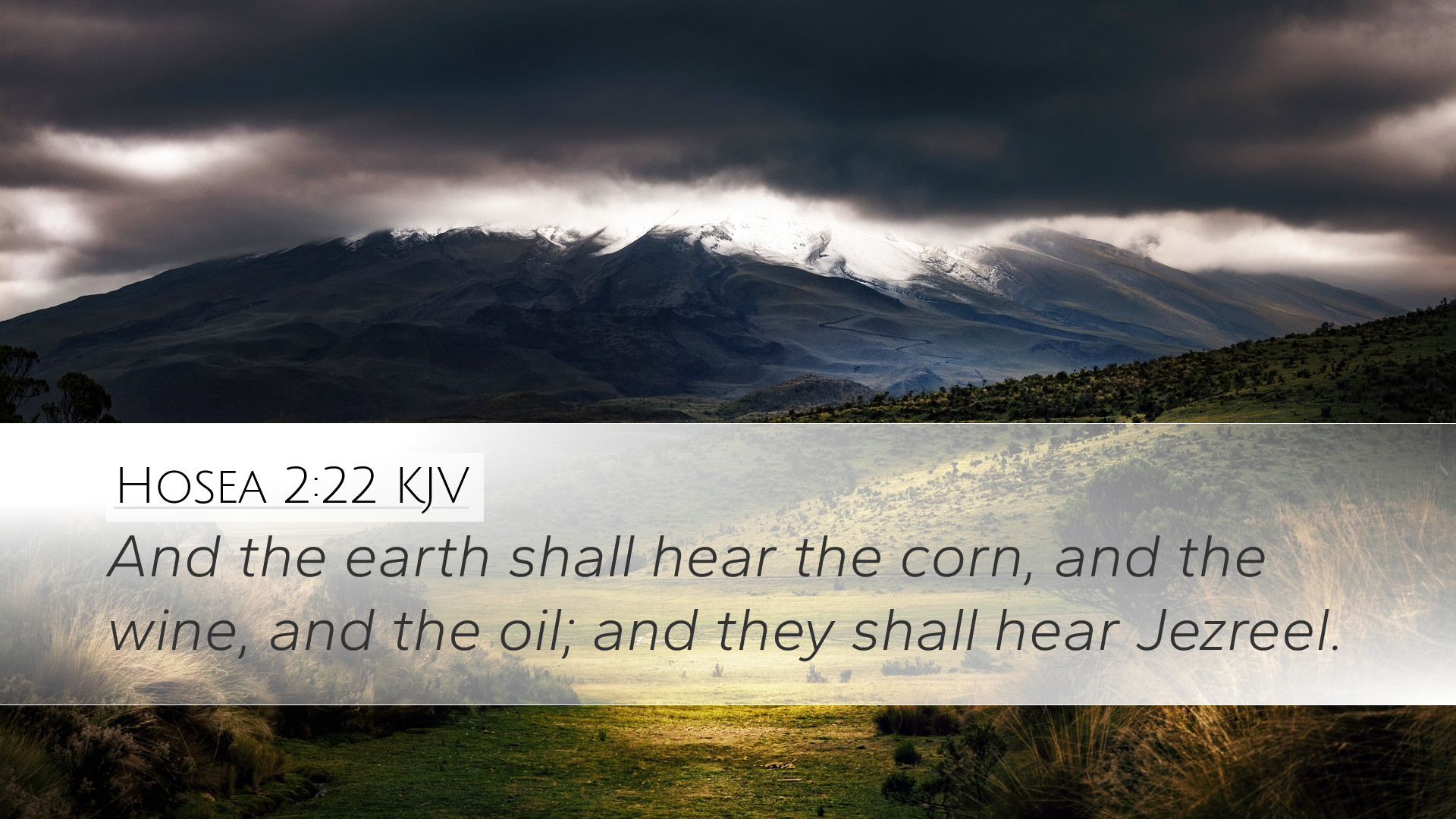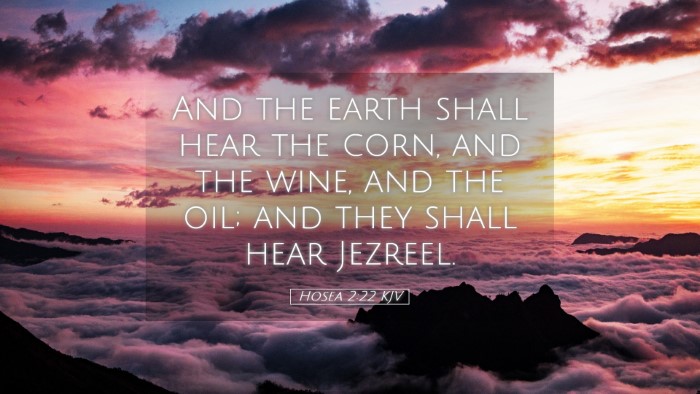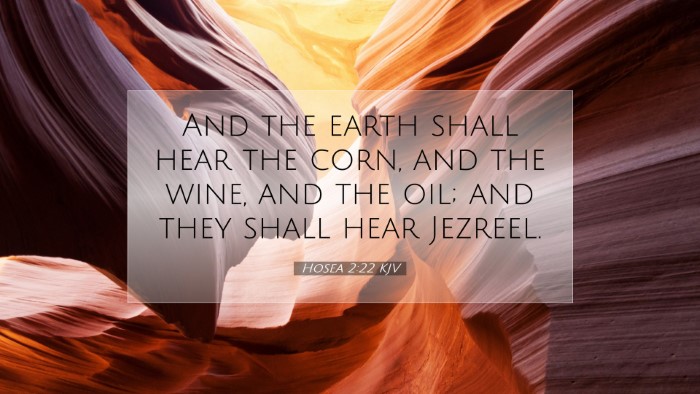Old Testament
Genesis Exodus Leviticus Numbers Deuteronomy Joshua Judges Ruth 1 Samuel 2 Samuel 1 Kings 2 Kings 1 Chronicles 2 Chronicles Ezra Nehemiah Esther Job Psalms Proverbs Ecclesiastes Song of Solomon Isaiah Jeremiah Lamentations Ezekiel Daniel Hosea Joel Amos Obadiah Jonah Micah Nahum Habakkuk Zephaniah Haggai Zechariah MalachiHosea 2:22
Hosea 2:22 KJV
And the earth shall hear the corn, and the wine, and the oil; and they shall hear Jezreel.
Hosea 2:22 Bible Commentary
Commentary on Hosea 2:22
Verse Text: "And the earth shall hear the corn, and the wine, and the oil; and they shall hear Jezreel."
Introduction
The book of Hosea serves as a crucial text within the prophetic literature, portraying profound themes of love, judgment, and restoration. In 2:22, the prophet Hosea delivers a striking image of the reconciliation between God, Israel, and the land, culminating in a message of hope amid suffering. To grasp the full weight of this passage, it is essential to explore the interpretations of notable public domain commentaries.
Examination of Key Elements
This verse speaks of the earth's response to God's actions, specifically highlighting the agricultural products: corn, wine, and oil, which are symbols of abundance and God’s blessings upon His people.
1. The Earth Shall Hear
Matthew Henry elaborates that when the earth "hears," it signifies an alignment with divine purposes; it reacts positively to the restoration that God brings. It refers not only to the literal geographic entities but also symbolizes the holistic relationship between creation and the Creator.
2. The Blessings: Corn, Wine, and Oil
Albert Barnes notes that these three elements represent the staples of life and prosperity in ancient Israel. Corn (or grain) is essential for sustenance, wine is instrumental not only in daily life but also in celebration and offerings, and oil symbolizes both nourishment and anointing. Together, these elements denote the fullness and restoration of life under God's favor.
3. The Mention of Jezreel
Adam Clarke emphasizes the significance of "Jezreel" in this context. Historically, Jezreel is a geographical location known for its fertility and as a center of Israel's agricultural strength, but it is also associated with the severe judgment that God pronounced upon Israel. The name symbolizes the duality of judgment and grace, as God can bring about both destruction due to sin and restoration upon repentance.
Contextual Considerations
Hosea's prophecy addresses the spiritual adultery and idolatry of Israel, leading to a period of divine chastisement. In Hosea 1, God commands him to marry a promiscuous woman, symbolizing Israel's unfaithfulness to God. In this light, 2:22 serves as a pivotal moment, capturing the essence of hope and restoration after a period of desolation.
1. Restoration of Israel
The central theme in the latter part of Hosea is God's intention to restore Israel. As Matthew Henry explains, despite the punishment for their sins, God’s love prevails. The promise of the earth hearing the abundance points to a future revival when Israel turns back to the Lord.
2. Theological Implications
This verse reflects God's covenant fidelity. As noted by Barnes, the cyclical nature of sin, punishment, and restoration illustrates the unbreakable covenant bond God has with His people. Understanding this is vital for pastors and theologians as it encapsulates the broader narrative of salvation history.
Applications for Today
For contemporary readers, Hosea 2:22 is rich with implications. It assures believers that even in times of estrangement from God, repentance leads to restoration. The agricultural metaphor used here can serve as a reminder that spiritual vitality directly influences life's practical blessings.
- Hope Amidst Trials: Just as the earth responds following God's declaration, individuals facing spiritual drought can trust in eventual divine blessings.
- Encouragement of Repentance: As Israel's restoration is tied to their return to God, this passage encourages believers to turn back to God for renewed blessings.
- Affirmation of God’s Promises: The assurance that the land will "hear" indicates a faithful God who honors His covenant, an encouragement for faith leaders to speak God's promises into their congregations.
Conclusion
Hosea 2:22 represents a pivotal juncture in the prophetic book where judgment gives way to hope. The imagery of a responsive creation underscores God's comprehensive plan to restore His people. For pastors, students, and theologians, this verse encourages a deeper appreciation for the interconnectedness of God's creation and His promises. It calls believers to recognize the rich theological narrative that echoes through the themes of restoration, redemption, and the profound depth of God's love.


